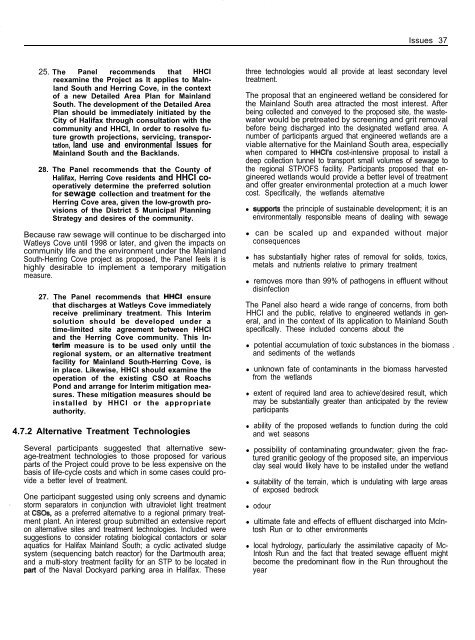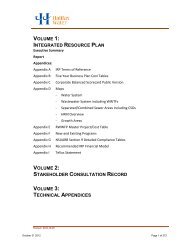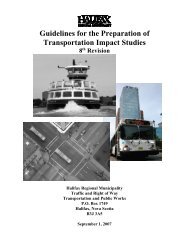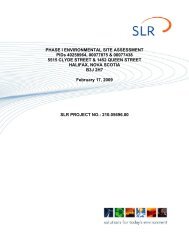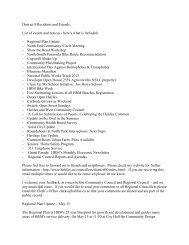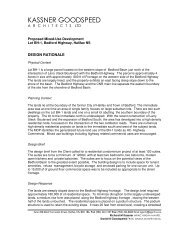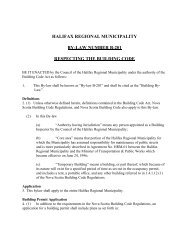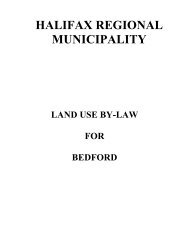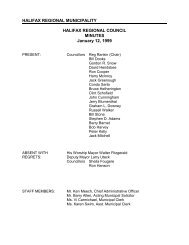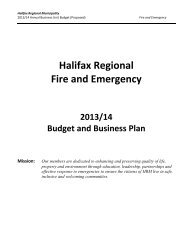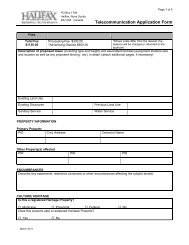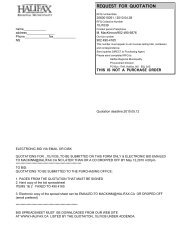Halifax Harbour Cleanup Inc. - Halifax Regional Municipality
Halifax Harbour Cleanup Inc. - Halifax Regional Municipality
Halifax Harbour Cleanup Inc. - Halifax Regional Municipality
Create successful ePaper yourself
Turn your PDF publications into a flip-book with our unique Google optimized e-Paper software.
Issues 37<br />
25. The Panel recommends that HHCI<br />
reexamine the Project as It applies to Malnland<br />
South and Herring Cove, in the context<br />
of a new Detailed Area Plan for Mainland<br />
South. The development of the Detailed Area<br />
Plan should be immediately initiated by the<br />
City of <strong>Halifax</strong> through consultation with the<br />
community and HHCI, In order to resolve future<br />
growth projections, servicing, transportatlon,<br />
land use and environmental Issues for<br />
Mainland South and the Backlands.<br />
28. The Panel recommends that the County of<br />
<strong>Halifax</strong>, Herring Cove residents and HHCI cooperatively<br />
determine the preferred solution<br />
for sewage collection and treatment for the<br />
Herring Cove area, given the low-growth provisions<br />
of the District 5 Municipal Planning<br />
Strategy and desires of the community.<br />
Because raw sewage will continue to be discharged into<br />
Watleys Cove until 1998 or later, and given the impacts on<br />
community life and the environment under the Mainland<br />
South-Herring Cove project as proposed, the Panel feels it is<br />
highly desirable to implement a temporary mitigation<br />
measure.<br />
27. The Panel recommends that HHCI ensure<br />
that discharges at Watleys Cove immediately<br />
receive preliminary treatment. This Interim<br />
solution should be developed under a<br />
time-limited site agreement between HHCI<br />
and the Herring Cove community. This lnterim<br />
measure is to be used only until the<br />
regional system, or an alternative treatment<br />
facility for Mainland South-Herring Cove, is<br />
in place. Likewise, HHCI should examine the<br />
operation of the existing CSO at Roachs<br />
Pond and arrange for Interim mitigation measures.<br />
These mitigation measures should be<br />
installed by HHCI or the appropriate<br />
authority.<br />
4.7.2 Alternative Treatment Technologies<br />
Several participants suggested that alternative sewage-treatment<br />
technologies to those proposed for various<br />
parts of the Project could prove to be less expensive on the<br />
basis of life-cycle costs and which in some cases could provide<br />
a better level of treatment.<br />
One participant suggested using only screens and dynamic<br />
storm separators in conjunction with ultraviolet light treatment<br />
at CSOs, as a preferred alternative to a regional primary treatment<br />
plant. An interest group submitted an extensive report<br />
on alternative sites and treatment technologies. <strong>Inc</strong>luded were<br />
suggestions to consider rotating biological contactors or solar<br />
aquatics for <strong>Halifax</strong> Mainland South; a cyclic activated sludge<br />
system (sequencing batch reactor) for the Dartmouth area;<br />
and a multi-story treatment facility for an STP to be located in<br />
pari of the Naval Dockyard parking area in <strong>Halifax</strong>. These<br />
three technologies would all provide at least secondary level<br />
treatment.<br />
The proposal that an engineered wetland be considered for<br />
the Mainland South area attracted the most interest. After<br />
being collected and conveyed to the proposed site, the wastewater<br />
would be pretreated by screening and grit removal<br />
before being discharged into the designated wetland area. A<br />
number of participants argued that engineered wetlands are a<br />
viable alternative for the Mainland South area, especially<br />
when compared to HHCl’s cost-intensive proposal to install a<br />
deep collection tunnel to transport small volumes of sewage to<br />
the regional STP/OFS facility. Participants proposed that engineered<br />
wetlands would provide a better level of treatment<br />
and offer greater environmental protection at a much lower<br />
cost. Specifically, the wetlands alternative<br />
• +pports the principle of sustainable development; it is an<br />
environmentally responsible means of dealing with sewage<br />
• can be scaled up and expanded without major<br />
consequences<br />
• has substantially higher rates of removal for solids, toxics,<br />
metals and nutrients relative to primary treatment<br />
• removes more than 99% of pathogens in effluent without<br />
disinfection<br />
The Panel also heard a wide range of concerns, from both<br />
HHCI and the public, relative to engineered wetlands in general,<br />
and in the context of its application to Mainland South<br />
specifically. These included concerns about the<br />
• potential accumulation of toxic substances in the biomass .<br />
and sediments of the wetlands<br />
• unknown fate of contaminants in the biomass harvested<br />
from the wetlands<br />
• extent of required land area to achieve’desired result, which<br />
may be substantially greater than anticipated by the review<br />
participants<br />
• ability of the proposed wetlands to function during the cold<br />
and wet seasons<br />
• possibility of contaminating groundwater; given the fractured<br />
granitic geology of the proposed site, an impervious<br />
clay seal would likely have to be installed under the wetland<br />
• suitability of the terrain, which is undulating with large areas<br />
of exposed bedrock<br />
• odour<br />
• ultimate fate and effects of effluent discharged into Mclntosh<br />
Run or to other environments<br />
• local hydrology, particularly the assimilative capacity of Mc-<br />
Intosh Run and the fact that treated sewage effluent might<br />
become the predominant flow in the Run throughout the<br />
year


